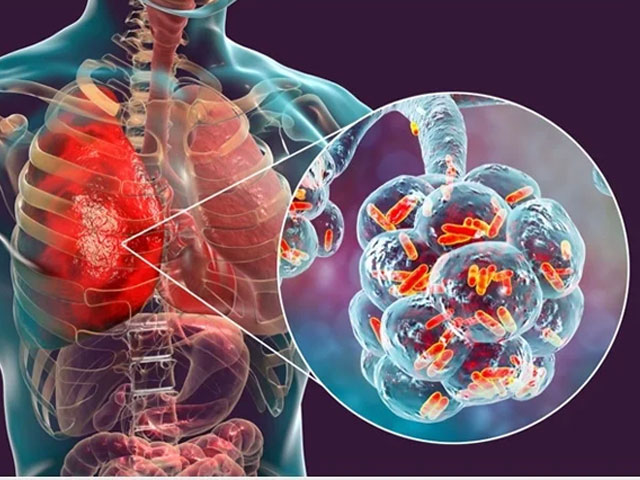
What is Pneumonia?
Pneumonia (or pneumonitis) is an inflammation of the lung tissue. It occurs due to various microorganisms, especially bacteria. It is among the diseases that cause the most deaths in the world. The term „old man’s friend” is frequently used for the disease because it is very common in people over 65 years of age.
The frequency of the disease increases in cold seasons, but this is not because of the cold itself. The main reason is that people spend a lot of time indoors and in close proximity to each other in such weather.
Pneumonitis often occurs when microbes from the patient’s own mouth, throat or digestive tract reach the lungs. These germs, which normally do not do any harm, can cause the disease in people with weakened body defenses.
The disease is rarely contagious, but the underlying infections can be. These infections can be spread by sneezing and coughing and can be passed on to other people through mouth and nose secretions and infected items such as glasses, handkerchiefs, cutlery and spoons.
What are the symptoms of pneumonia?
Pneumonia is a health problem that should not be neglected. It is known that early diagnosis and starting treatment without delay reduces deaths. If the patient’s complaints are compatible with the disease, the diagnosis can usually be made by examination and findings on chest x-ray. In a typical case, the following symptoms are observed:
- Chills and shivering
- High fever
- Cough
- Dirty, purulent (green, yellow, rust-colored) sputum
- Pain around the chest
Pneumonia risk factors
- Advanced age
- COPD
- Bronchiectasis
- Lung cancer
- Chronic heart disease
- Chronic kidney diseases
- Liver diseases
- Diabetes
- Diseases and abnormalities that cause swallowing difficulties
- AIDS
- Leukemia
- Lymph Cancer
- Cigarette smoking
- Alcohol intake
- Flu outbreaks
How to prevent pneumonia?
The best way to prevent pneumonia is to control the factors that can cause it. Avoiding stress, ensuring a balanced diet, staying away from alcohol and tobacco, and hygienic housing conditions are primary precautions. Also if there is a chronic disease, it is a must to take that under control.
During influenza epidemics, which can cause or facilitate pneumonia, it is important to reduce contact in crowds, use masks and vaccinate people who can transmit influenza, especially in high-risk groups.
Vaccines have been developed to protect against influenza which provide protection for one year. Influenza vaccines should be given one dose intramuscularly every year in September, October or November at the latest. Influenza vaccines should be given to people at high risk of getting the flu, or to people for whom the flu can be severe and fatal.
Treatment of pneumonia
Treatment should be planned according to the patient. While most cases can be treated at home, patients with chronic diseases and elderly patients require hospitalization. When treatment is started early the results are favorable. In cases where treatment is started late and in severe cases of pneumonia, the mortality rate is high.
In which cases pneumococcal vaccine is recommended?
The most common microorganism in pneumonia cases is Streptococcus pneumoniae. There is a vaccine against this bacterium, which we call pneumococcus. Pneumococci can cause infection in different parts of the respiratory tract as well as lungs.
Pneumococcus vaccine can provide partial protection for up to 5 years when administered to high-risk individuals. Vaccination can recommended in the following cases:
- People with chronic diseases
- Those with immune problems
- Those who have undergone organ transplantation
- Adults who are AIDS carriers
- 65 years and older

